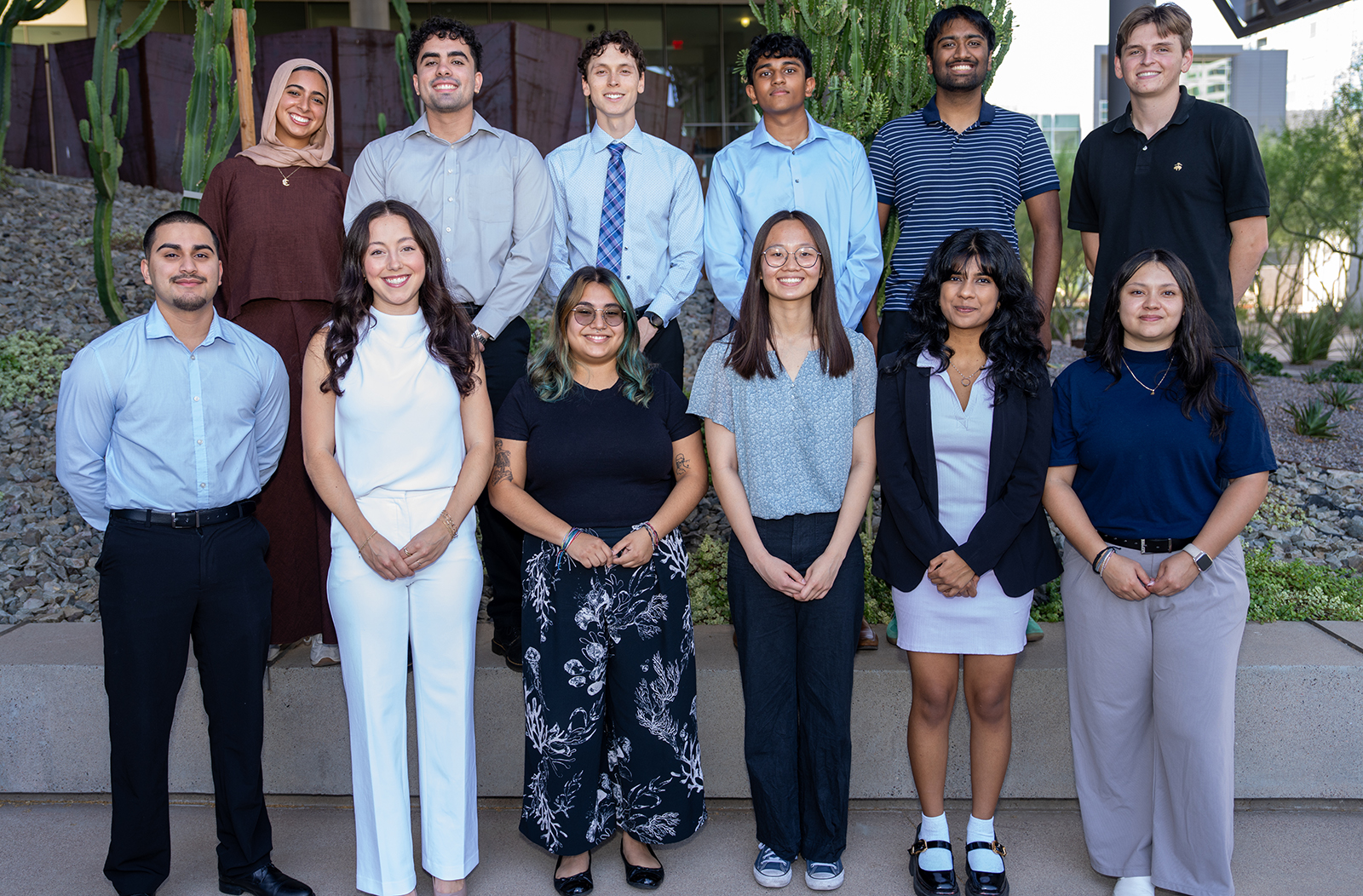
Flinn Foundation Summer Internship Pairs Researchers with Aspiring Medical Students

By inviting the next generation of physician-scientists, the University of Arizona College of Medicine – Phoenix continues to foster an enthusiasm for discovery through the Flinn Foundation Summer Internship Program.
The internship offers an opportunity for undergraduate students to engage in hypothesis-driven research and to interact with other students, postdoctoral associates and faculty in a welcoming environment.
In its third year, the annual program paired 12 undergraduate students with physician-scientists among various specialties. During their paid internship, the students developed hypotheses, conducted scientific research and then presented their findings at a half-day symposium (images from the event).
“Inspiring scientific discovery and innovation is a key component of our college’s mission to train exemplary physicians, scientists and leaders,” said Dean Fred Wondisford, MD, MS, MBA, who served as a mentor. “It was a privilege witnessing the next generation of researchers showcase their dedication toward science and health care.”
Hana Roushdy
Hana Roushdy’s passion for medicine has been a slow burn; she had initial goals of becoming a midwife and enrolled in a nursing program. However, as she progressed, her fascination for science, health, anatomy and research grew stronger, drawing her to a career in medicine.

“Switching to pre-med in my sophomore year was intimidating, but those challenges cemented my passion,” Roushdy said. “My interest in medicine has steadily deepened through patient interactions, anatomy classes, laboratory work, clinical hours as a scribe and volunteering in the NICU.”
Roushdy’s research in the lab of Tatiana Kalin, MD, PhD — a professor of Child Health and vice chair of Translational Research — focused on acute lung injury following total body irradiation and bone marrow transplantation in pediatric patients.
“Since little research exists, specifically on how these two interventions cause lung injury in children, our lab aims to uncover the underlying pathological mechanisms and translate findings to improve clinical care,” Roushdy said.
This experience gave Roushdy invaluable exposure to the molecular biology side of medicine. For Roushdy, the biggest takeaway from the Flinn Foundation Summer Internship was the importance of mentorship and collaboration.
“The lab is filled with people willing to teach, guide and support you if you reach out and ask for help,” Roushdy said. “This environment has helped me discover my interests in pediatric hematology/oncology and clarified what aspects of medicine resonate with me most.”
Abigail Urbina-Bernal
Abigail Urbina-Bernal grew up aspiring to be a marine biologist, but her dreams shifted once she took a medical studies class in her freshman year of high school. From there, she got herself involved in several medicine-related clubs and served in the Cardiology & Radiology Services Department at Banner Thunderbird Medical Center.

As an intern under Nipavan Chiamvimonvat, MD, chair of the Department of Basic Medical Sciences, Urbina-Bernal’s research centered on human-induced pluripotent stem cell-derived cardiomyocytes; and she utilized models to study the molecular mechanisms behind cardiac arrhythmias and sudden cardiac death.
“After my lab experience with the Translational Cardiovascular Research Center, I have never been more certain about wanting to integrate research into my career as a physician,” Urbina-Bernal said. “I am certain that my experiences in Dr. Chiamvimonvat’s lab will only supplement the skills needed for a successful physician-scientist.”
For Urbina-Bernal, more than ever it is important for individuals pursuing a career in medicine to have some sort of research experience before applying to professional school. Through the Flinn Foundation Summer Internship program, she sharpened accurate and trustworthy communication skills.
“Science is ever evolving, and it is important to stay up to date with the research that comes out, the innovations being made and the questions being asked amongst scientists globally,” Urbina-Bernal said. “I’m incredibly thankful to have been a part of this experience and to share my time in the laboratory.”
Michelle Padilla Soto
Growing up, Michelle Padilla Soto’s family relied on home remedies for any illness or pain. She later found out these remedies stemmed from fear of the cost, the language barriers and the unfamiliarity of hospitals.
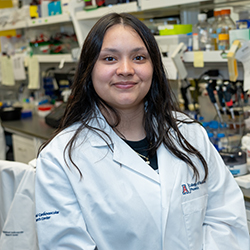
“These experiences made want to become a bridge between Hispanic families and the health care system,” Padilla Soto said. “Volunteering as a Spanish interpreter in free clinics that serve uninsured Hispanic patients in Phoenix has been one way I have started doing that.”
Padilla Soto discovered the Flinn Foundation Summer Internship Program while searching for medical internships.
“What drew me was the chance to work alongside leading medical researchers and gain hands-on experience,” Padilla Soto said.
“I was also excited about the opportunity to become more familiar with the U of A College of Medicine – Phoenix, which is somewhere I hope to return to in the future.”
Her research in the lab of Christopher Glembotski, PhD — director of the Translational Cardiovascular Research Center, and vice dean of Research — focused on mimicking heart failure by chemically-inducing hypertrophy in models using phenylephrine. This allows them to study early stress responses in the heart that are like those seen in heart failure.
“This experience has given me a deeper appreciation for the heart, not just as an organ, but as a system that works constantly to protect the body,” Padilla Soto said. “It has reminded me how interconnected the body is and how much there is still to learn.”
Tara Fatima
Tara Fatima’s love for academia, education and empowerment are seamlessly woven into a career in medicine. She aims to learn, teach and uplift others, and she feels that is magnified most with a career in medicine.

“As a physician who will be able to contribute to the forever-growing expanse of our knowledge through science, I am not only able to commit to life-long learning, but also to educate patients and create solutions to problems myself,” Fatima said.
Fatima heard of the Flinn Foundation Summer Internship program from a close friend who happened to previously be an intern. Discovering the program’s mission to push interns to become physician-scientists who can translate findings at the bench to treatment at the bedside, she was compelled to apply.
Under the mentorship of Liya Yin, MD, PhD, professor in the college’s Department of Internal Medicine, Fatima’s research analyzed the role of a particular microRNA in coronary microvascular disease (CMD).
“The work is incredibly important given that we are testing this inquiry with diabetic in-vivo studies, and diabetic patients are at the higher risk of major adverse cardiac events with the onset of CMD,” Fatima said.
The internship experience saw each discussion and conversation inspire Fatima more to keep pursuing a career in medicine. It also reinforced her decision to pursue translational science for medicine.
“My critical-thinking and problem-solving skills have been solidified through this internship,” Fatima said. “Expecting the unexpected, working around obstacles and adversities is oftentimes tedious, but always a privilege.”
Flinn Foundation Summer Interns and Their Mentors
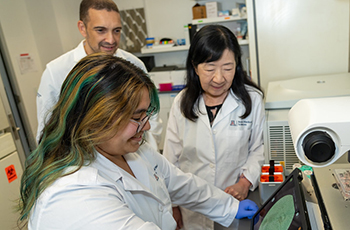
Nipavan Chiamvimonvat, MD, and Abigail Urbina-Bernal
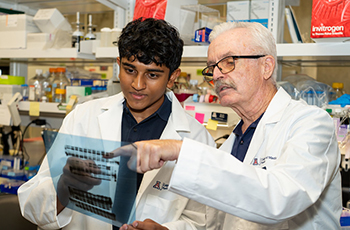
Christopher Glembotski, PhD, and Ashwin Suresh
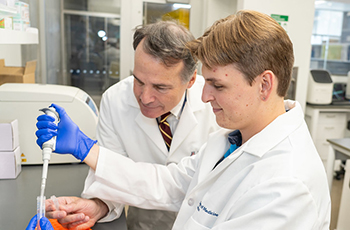
Fred Wondisford, MD, MS, MBA, and Declan Cappasola
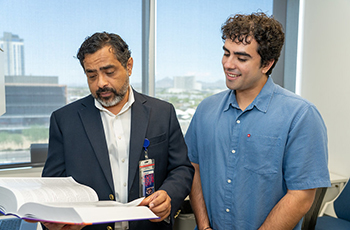
Ayman Fanous, MD, and Eliu Zaragoza
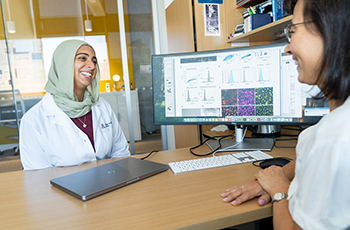
Tatiana Kalin, MD, PhD, and Hana Roushdy
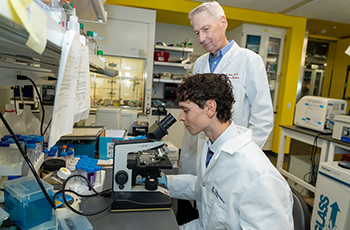
Guy Reed, MD, MS, and Mathew Griffin
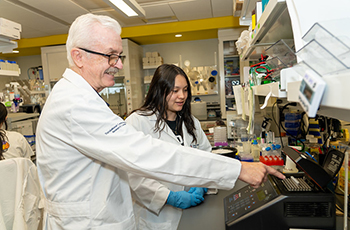
Christopher Glembotski, PhD, and Michelle Padilla Soto

Hongyu Qiu, MD, PhD, and Nicole Lalime

Melissa Herbst-Kralovetz, PhD, and Rachel Opferman

Alexander B. Niculescu, MD, and Robert Salgado
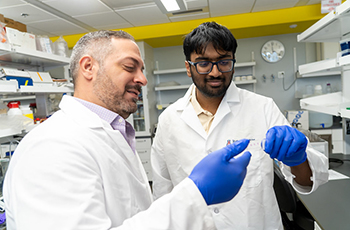
Sarmed Al-Samerria, PhD, and Sunny Vakkalanka
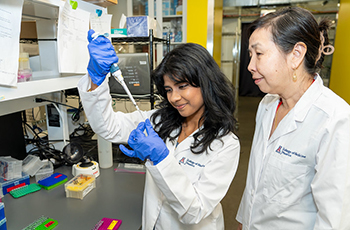
Liya Yin, MD, PhD, and Tara Fatima
More Photos from the 2025 Flinn Foundation Summer Internship
About the College
Founded in 2007, the University of Arizona College of Medicine – Phoenix inspires and trains exemplary physicians, scientists and leaders to advance its core missions in education, research, clinical care and service to communities across Arizona. The college’s strength lies in our collaborations and partnerships with clinical affiliates, community organizations and industry sponsors. With our primary affiliate, Banner Health, we are recognized as the premier academic medical center in Phoenix. As an anchor institution of the Phoenix Bioscience Core, the college is home to signature research programs in neurosciences, cardiopulmonary diseases, immunology, informatics and metabolism. These focus areas uniquely position us to drive biomedical research and bolster economic development in the region.
As an urban institution with strong roots in rural and tribal health, the college has graduated more than 1,000 physicians and matriculates 130 students each year. Greater than 60% of matriculating students are from Arizona and many continue training at our GME sponsored residency programs, ultimately pursuing local academic and community-based opportunities. While our traditional four-year program continues to thrive, we will launch our recently approved accelerated three-year medical student curriculum with exclusive focus on primary care. This program is designed to further enhance workforce retention needs across Arizona.
The college has embarked on our strategic plan for 2025 to 2030. Learn more.